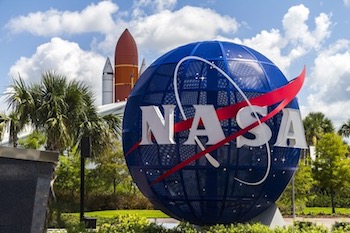On September 16, 2016, United States Senators Ted Cruz (R-TX), Bill Nelson (D-FL.), Marco Rubio (R-FL), Gary Peters (D-MI), Roger Wicker (R-MS), and Tom Udall (D-NM) introduced S. 3346, The National Aeronautics and Space Administration (NASA) Transition Authorization Act of 2016. The legislation sought to provided stability for NASA to sustain and build upon existing national space investments designed to advance space exploration with an overall authorization level of $19.508 billion for fiscal year 2017.https://www.123rf.com/photo_48460366_nasa-kennedy-space-center-entrance-in-florida.html
On December, 10, 2016, the United States Senate passed the NASA Transition Authorization Act of 2016 unanimously. The NASA Transition Authorization Act would reaffirm existing policy regarding use of the International Space Station (ISS) and would require NASA to develop a transition plan that would enable greater participation in the ISS and would require NASA to develop propulsion technologies intended to reduce travel time to Mars, as well as develop a strategic framework for human space flight to Mars.
In a press release issued on December 10, 2016, Senator Cruz, the primary sponsor of the NASA Transition Authorization Act of 2016, said:
America has long led the way in exploring the unchartered territory of deep space, which has also fostered extraordinary economic growth and job creation for the State of Texas and the entire nation. And today, Republicans and Democrats stood united to reassert the need for certainty in the U.S. space program moving forward. This broad, bipartisan legislative achievement provides NASA with the stability it needs as the agency transitions to a new administration. It also lays an important marker as we continue working to enact this important legislation as soon as possible. I look forward to working with colleagues in both chambers and on both sides of the aisle again next year to ensure that our nation’s new era of pioneers can continue to innovate and explore with clarity and purpose.
According to a Congressional Budget Office analysis: (1) Enacting this legislation will increase net direct spending by $35 million over the 2017-2026 period; and (2) The bill would not increase net direct spending or on-budget deficits by more than $5 billion in any of the four consecutive 10-year periods beginning in 2027.
[Patent-Business]
Highlights of S. 3346
Sustaining National Space Commitments and Utilizing the International Space Station
Support for Continuity – The Act affirms support for sustained space investments across presidential administrations to advance recent achievements in space exploration and space science. This includes the development of the Space Launch System heavy-lift rocket and the Orion crew vehicle for deep space exploration, maximizing utilization of the International Space Station (ISS), the James Webb Space Telescope, and continued commitment to a national, government-led space program.
International Space Station – The Act supports full and complete utilization of the ISS through at least 2024, and the use of private sector companies partnering with NASA to deliver cargo and experiments. Also facilitates the development of vehicles to transport astronauts from U.S. soil to end our reliance on Russian launches for crew transport.
Facilitating Commercialization and Economic Development of Low-Earth Orbit – The Act requires NASA to submit a report to Congress outlining a plan to facilitate a transformation of operations in low-earth orbit from a model largely reliant on government support to one reflecting a more commercially viable future.
Advancing Human Deep Space Exploration
Journey to Mars – The Act amends current law by adding human exploration of Mars as one of the goals and objectives of NASA and directs NASA to manage human space flight programs to enable humans to explore Mars and other destinations. Requires NASA to develop and submit a plan to Congress on a strategic framework and critical decision plan based on current technologies to achieve the exploration goals and objectives.
Development of Deep Space Capabilities – The Act directs NASA to continue the development of the Space Launch System and Orion for a broad deep space mission set, with specific milestones for an uncrewed exploration mission by 2018 and a crewed exploration mission by 2021.
Medical Monitoring of Astronauts
Medical Effects of Space – The Act authorizes NASA to provide for the medical monitoring, diagnosis, and treatment of astronauts, including scientific and medical tests for psychological and medical conditions deemed by NASA to be associated with human space flight.
Recognizing Impact of Scott Kelly’s 340 Days in Space –The Act gives recognition that the 340-day space mission of Scott Kelly aboard the ISS generated new insight into how the human body adjusts to weightlessness, isolation, radiation, and the stress of long-duration space flight and will help support the physical and mental well-being of astronauts during longer space exploration missions in the future.
Improving Cybersecurity and Maximizing Efficiency
Improved Oversight of IT and Cybersecurity – The Act directs steps to improve agency-wide management and oversight over information technology operations and investments and information security programs for the protection of NASA systems, implementing a number of Office of Inspector General and GAO identified deficiencies. The Act also requires the Administrator to ensure the NASA Chief Information Officer has a significant role in relevant management and oversight.
Agency Cybersecurity Requirements – The Act requires the Administrator develop an agency-wide security plan to provide an overview of the requirements of NASA systems, identification of roles and responsibilities, and increased coordination among each center, facility, and mission directorate.
Image Source: 123RF.com Image ID: 48460366 © Robin Runck.

![[IPWatchdog Logo]](https://ipwatchdog.com/wp-content/themes/IPWatchdog%20-%202023/assets/images/temp/logo-small@2x.png)


![[Advertisement]](https://ipwatchdog.com/wp-content/uploads/2024/04/UnitedLex-May-2-2024-sidebar-700x500-1.jpg)
![[Advertisement]](https://ipwatchdog.com/wp-content/uploads/2024/04/Artificial-Intelligence-2024-REPLAY-sidebar-700x500-corrected.jpg)
![[Advertisement]](https://ipwatchdog.com/wp-content/uploads/2024/04/Patent-Litigation-Masters-2024-sidebar-700x500-1.jpg)

![[Advertisement]](https://ipwatchdog.com/wp-content/uploads/2021/12/WEBINAR-336-x-280-px.png)
![[Advertisement]](https://ipwatchdog.com/wp-content/uploads/2021/12/2021-Patent-Practice-on-Demand-recorded-Feb-2021-336-x-280.jpg)
![[Advertisement]](https://ipwatchdog.com/wp-content/uploads/2021/12/Ad-4-The-Invent-Patent-System™.png)






Join the Discussion
No comments yet.